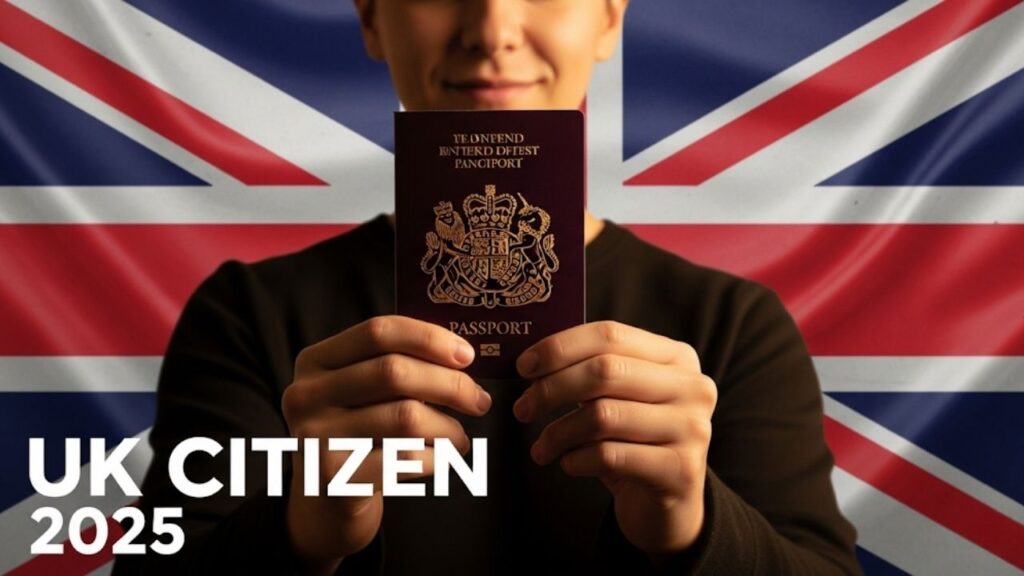Becoming a UK citizen in 2025 is a significant life goal for many, a final step that transforms years of living and working in the UK into a permanent sense of belonging. But the path to a British passport can feel like a complex maze of rules, requirements, and paperwork. You might be wondering: Am I eligible? Where do I even begin? This guide is designed to be your clear, trusted companion, demystifying the process and providing you with the actionable steps needed to confidently pursue your application for British citizenship through naturalisation.

UK citizen in 2025
| Key Requirement | Detail |
| Residency | Typically 5 years of residence in the UK (3 years if married to a British citizen).UK Gov Residency Rules |
| Good Character | No serious or recent criminal record, and you haven’t tried to deceive the Home Office.UK Gov Good Character Guidance |
| Knowledge of UK | You must pass the official “Life in the UK Test.” |
| English Language | Prove you have sufficient knowledge of English, Welsh, or Scottish Gaelic. |
The journey to becoming a UK citizen in 2025 is a marathon, not a sprint. It requires careful planning, attention to detail, and patience. By understanding the requirements, preparing your evidence thoroughly, and following the steps outlined here, you can approach your application with confidence. This isn’t just about navigating bureaucracy; it’s about taking the final step to officially call the United Kingdom your home. Your new chapter awaits—start preparing for it today.
Understanding British Citizenship: More Than Just a Passport
Gaining British citizenship is about more than the right to hold a UK passport and vote in elections. It signifies full integration into British society, offering stability and security for you and your family. It removes any future immigration restrictions, gives you the freedom to live and work in the UK indefinitely, and allows you to travel more freely. It’s the culmination of your journey, cementing your place in the fabric of the United Kingdom.
The Core Pathways to Becoming a UK Citizen in 2025
While there are several ways to become a British citizen, the vast majority of applicants will follow the path of ‘naturalisation’. Let’s break down the most common routes.
Naturalisation: The Most Common Route
This is the process by which a non-British adult who has lived in the UK for a specific period applies to become a citizen. To qualify for naturalisation UK, you must meet a strict set of criteria that demonstrate your commitment and integration into British life. This is the path we will focus on for the rest of this guide.
Other Routes to Citizenship
While less common, it’s worth knowing about other pathways:
- By Birth: If you were born in the UK and at least one of your parents was a British citizen or ‘settled’ in the UK at the time of your birth.
- By Descent: If you were born outside the UK but one of your parents was a British citizen otherwise than by descent (e.g., they were born or naturalised in the UK).
- By Registration: This route is often used for children or for individuals with a historical connection to the UK, such as those who are stateless.
The Essential UK Citizenship Requirements Checklist
Ready to see if you qualify? Here’s a detailed breakdown of the key eligibility criteria you’ll need to meet for your 2025 application. In my experience advising applicants, the most common reason for delays is not having all the correct evidence ready from the start, so pay close attention to this section.

1. Residency Rules: The Five (or Three) Year Wait
The foundation of any naturalisation application is your residency period.
- Standard Route: You must have lived in the UK for at least five years before the date of your application.
- Spouse/Partner Route: If you are married to or in a civil partnership with a British citizen, this period is reduced to three years.
Crucially, for the 12 months immediately before applying, you must have held Indefinite Leave to Remain (ILR), settled status under the EU Settlement Scheme, or Indefinite Leave to Enter.
The Home Office also looks at your absences from the UK:
- During the 5-year qualifying period, you must not have spent more than 450 days outside the UK.
- During the 3-year qualifying period, you must not have spent more than 270 days outside the UK.
- In the final 12 months before applying, you must not have spent more than 90 days outside the UK.
2. The ‘Good Character’ Requirement
This is one of the most subjective but critical UK citizenship requirements. The Home Office will assess your character by looking at various aspects of your life to ensure you respect the UK’s laws and values. This includes:
- Criminal Records: Any unspent criminal convictions will likely lead to a refusal.
- Immigration History: You must not have broken any immigration laws (e.g., overstaying a visa).
- Financial Soundness: Issues like bankruptcy or failure to pay taxes can be problematic.
- Deception: Any evidence that you have been dishonest in your dealings with the UK government is taken very seriously.
3. Proving Your Knowledge: The Life in the UK Test
To demonstrate your understanding of British society, traditions, and history, you must pass the Life in the UK Test. This is a 45-minute computer-based test with 24 multiple-choice questions based on the official handbook.
You need to score 75% or more to pass, and you can retake the test as many times as you need, but you must pay the fee each time. It’s highly recommended to study the official handbook thoroughly.
4. English Language Proficiency
Unless you are from a majority English-speaking country or have a degree taught in English, you will need to prove your language skills. You can do this by passing a Secure English Language Test (SELT) from an approved provider. The test must be at least a B1 level on the Common European Framework of Reference for Languages (CEFR) scale, covering speaking and listening skills.
Your Step-by-Step Application Guide for 2025
Once you are confident you meet all the requirements, it’s time to apply.
Step 1: Gather Your Documents
This is the most time-consuming part. You will need a range of documents, including:
- Your passport and BRP card
- Proof you have ILR or settled status
- Your Life in the UK Test pass certificate
- Your English language test certificate
- Evidence of your residency (e.g., passports showing travel dates)
- Details of two referees who can vouch for your identity.
Step 2: Complete the Online Application
The application is completed on the official UK Visas and Immigration website. Be meticulous and double-check every piece of information you enter. Any mistakes can cause significant delays.
Step 3: Pay the Fee and Submit
You will need to pay the application fee online. As of late 2024, the fee is £1,580, but always check the official government page for the most current fees. After payment, you will be directed to book an appointment at a UK Visa and Citizenship Application Services (UKVCAS) centre to provide your biometric information (fingerprints and a photo).
Step 4: The Decision and Citizenship Ceremony
Waiting for a decision is often the hardest part. Processing times can take up to six months, sometimes longer. If your application is successful, you will receive an invitation to attend a citizenship ceremony. This is the final, celebratory step where you will take an oath of allegiance and receive your certificate of naturalisation. Only after the ceremony are you officially a British citizen.
Study for Free in Germany as an International Student: Your 2026 Guide
FAQs
Q1:How long does the UK citizenship application take in 2025?
The standard processing time stated by the Home Office is up to 6 months after you attend your biometrics appointment. However, this can vary depending on the complexity of your case and current application volumes.
Q2:What is the current cost of applying for British citizenship?
As of late 2024, the application fee for naturalisation is £1,580 per adult applicant. This fee is subject to change, so you should always verify the latest amount on the official GOV.UK fees page before applying. This fee does not include the cost of the Life in the UK Test or any English language tests.
Q3:Can my citizenship application be refused?
Yes, an application can be refused if you do not meet all the eligibility criteria. The most common reasons for refusal include failing the ‘good character’ requirement, having excessive absences from the UK, or providing incorrect information on your application. If refused, the application fee is not refunded.










